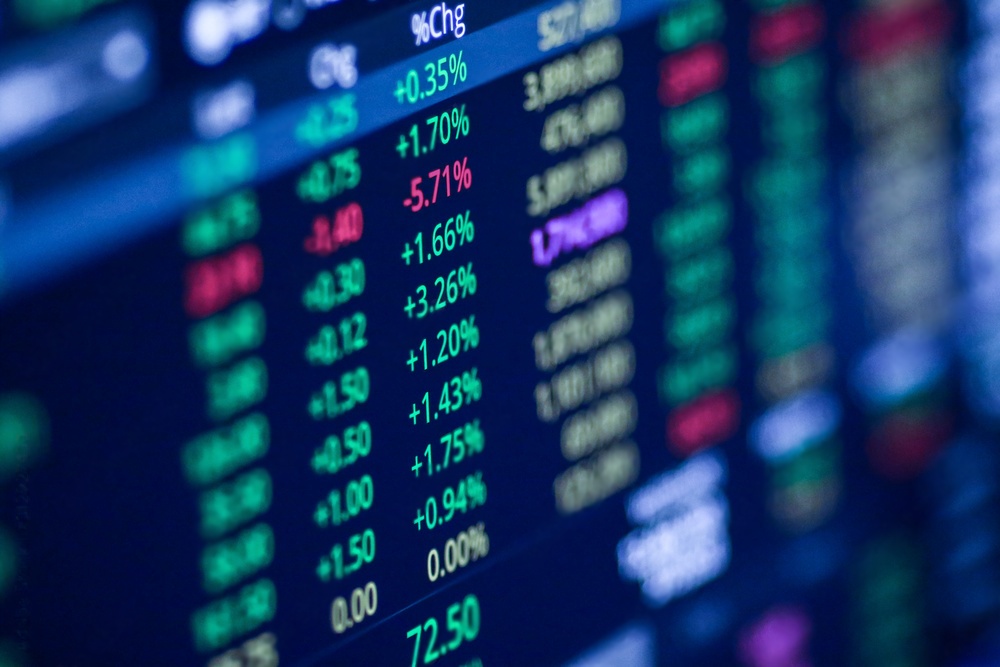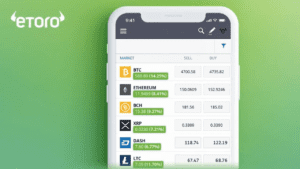Navigating the labyrinthine world of stock markets can be a daunting task, especially when you’re looking beyond your domestic borders. The European stock market, a complex tapestry of economies, cultures, and industries, offers a plethora of investment opportunities that are too significant to overlook. But to make the most of these opportunities, one must have a nuanced understanding of the various industry sectors that drive this market.
The European market is not just a monolithic entity; it’s a dynamic ecosystem of sectors, each with its own set of rules, risks, and rewards. Whether you’re a casual investor looking to diversify your portfolio or a professional asset manager seeking alpha, understanding these sectors is crucial for making informed investment decisions.
The objective of this article is to provide you with an in-depth look at the industry sectors that are the linchpins of the European stock market. We’ll delve deep into the intricacies of each sector, explore key players, and discuss investment strategies tailored to each. By the end of this read, you’ll have a comprehensive understanding of the European market landscape, empowering you to make investment choices that align with your financial goals. So, let’s dive in.
The Landscape of the European Stock Market
Historical Context
The European stock market has a rich history that dates back to the 17th century, with the establishment of the Amsterdam Stock Exchange, now part of Euronext. Over the centuries, the market has evolved, witnessing the rise and fall of empires, world wars, and economic booms and busts. Despite these tumultuous events, the European market has remained resilient, adapting to changes and emerging stronger.
Join the world's biggest trading network & get instant access to a personal account manager!
Post-World War II, Europe saw a period of rapid reconstruction and economic growth, leading to the formation of the European Union (EU) and the introduction of the Euro currency. These developments have made the European stock market an integral part of the global financial system.
Current Market Size and Significance
As of 2022, the European stock market represents a significant portion of the global market capitalization. According to data, the market cap of publicly listed companies in Europe is estimated to be around €25 trillion. This makes it a crucial player in the global financial landscape, attracting both domestic and international investors.
| Region | Market Capitalization (€ Trillion) |
|---|---|
| Europe | 25 |
| North America | 50 |
| Asia-Pacific | 30 |
| Rest of the World | 10 |
Key Stock Exchanges
- Euronext: Spanning multiple European countries including France, Belgium, the Netherlands, Portugal, and Ireland, Euronext is one of the most significant stock exchanges in Europe.
- Frankfurt Stock Exchange (Frankfurter Wertpapierbörse): Located in Germany, this exchange is one of the world’s largest trading centers for securities, and it’s operated by Deutsche Börse.
- London Stock Exchange (LSE): Despite Brexit, the LSE remains a key financial hub, not just for the UK but for Europe as a whole.
Each of these exchanges hosts a variety of companies from multiple industry sectors, offering investors a broad spectrum of investment opportunities.
Why Industry Sectors Matter
Diversification
Diversification is the cornerstone of a balanced investment portfolio. By investing in different industry sectors, you can mitigate the risks associated with the underperformance of a single sector. For example, while the technology sector may be susceptible to market volatility, the healthcare sector often provides stability. A well-diversified portfolio will include stocks from various sectors to balance out these risks and opportunities.
| Sector | Volatility Index |
|---|---|
| Technology | High |
| Healthcare | Low |
| Financial Services | Medium |
| Consumer Goods | Medium |
| Energy | High |
Risk Management
Understanding the dynamics of different industry sectors can help you manage risks more effectively. Each sector has its own set of challenges and opportunities, influenced by factors like economic cycles, technological advancements, and regulatory changes. Being aware of these can help you anticipate market movements and adjust your investment strategy accordingly.
Investment Strategy Alignment
Different sectors offer different types of investment opportunities. Some sectors are better for long-term growth (e.g., technology), while others may offer stable dividends (e.g., utilities). Aligning your investment choices with your financial goals—whether it’s capital appreciation, income generation, or risk minimization—is easier when you understand the characteristics of each sector.
By comprehending the importance of industry sectors in the European stock market, you can make more informed decisions, optimize your portfolio, and better align your investments with your financial objectives.
Technology Sector
Overview and Significance
The technology sector in Europe is a burgeoning field that has shown remarkable resilience and innovation over the past decade. While it may not have the same global giants as the U.S. market—think Apple, Google, and Amazon—the European tech sector is rich in startups and established firms that specialize in areas like software development, cybersecurity, and artificial intelligence. The sector is a significant contributor to economic growth and job creation, making it an attractive option for investors looking for long-term capital appreciation.
Key Players and Stocks
- SAP SE: This German multinational is a leader in enterprise software and is listed on the Frankfurt Stock Exchange.
- ASML Holding: A Dutch company specializing in photolithography systems for the semiconductor industry, listed on Euronext Amsterdam.
- Adyen: A global payment company headquartered in the Netherlands, also listed on Euronext Amsterdam.
| Company | Stock Exchange | Specialty |
|---|---|---|
| SAP SE | Frankfurt | Enterprise Software |
| ASML Holding | Euronext Amsterdam | Photolithography Systems |
| Adyen | Euronext Amsterdam | Payment Solutions |
Investment Opportunities and Risks
Opportunities
- Growth Potential: The tech sector is known for its high growth rates, driven by constant innovation.
- Global Reach: Many European tech companies serve a global customer base, offering geographic diversification.
Risks
- Volatility: Tech stocks can be highly volatile, influenced by market sentiment and regulatory changes.
- Competition: The sector faces stiff competition from global tech giants, particularly from the U.S. and Asia.
Healthcare Sector
Overview and Significance
The healthcare sector in Europe is another critical area of investment, especially given the continent’s aging population and focus on high-quality medical care. The sector encompasses a range of companies, from pharmaceutical giants to medical device manufacturers and healthcare service providers. With a steady demand for healthcare services and products, this sector often provides a safe haven during economic downturns.
Key Players and Stocks
- Novartis: A Swiss multinational pharmaceutical company listed on the SIX Swiss Exchange.
- Sanofi: A French multinational pharmaceutical company listed on Euronext Paris.
- AstraZeneca: A British-Swedish multinational pharmaceutical and biopharmaceutical company listed on the London Stock Exchange.
| Company | Stock Exchange | Specialty |
|---|---|---|
| Novartis | SIX Swiss | Pharmaceuticals |
| Sanofi | Euronext Paris | Pharmaceuticals |
| AstraZeneca | London | Pharmaceuticals and Biopharmaceuticals |
Investment Opportunities and Risks
Opportunities
- Stable Returns: Healthcare is generally considered a defensive sector, offering stable returns even in volatile markets.
- Innovation: With constant research and development, there’s potential for high growth in areas like biotechnology.
Risks
- Regulatory Hurdles: The sector is highly regulated, and companies often face challenges in getting approvals for new products.
- Market Saturation: In some areas, like generic pharmaceuticals, the market is highly competitive, which can limit growth.
By understanding the nuances of these sectors, investors can make informed decisions that align with their risk tolerance and investment objectives. Whether you’re looking for growth, stability, or a mix of both, the European technology and healthcare sectors offer a range of opportunities.
Financial Services Sector
Overview and Significance
The financial services sector is a cornerstone of the European economy, encompassing a wide array of institutions such as banks, insurance companies, asset managers, and fintech firms. This sector plays a pivotal role in facilitating economic activities, from lending and investment to insurance and payment services. Given its integral function in the financial health of both individuals and corporations, the financial services sector often serves as a barometer for the broader economy.
Key Players and Stocks
- HSBC Holdings: A British multinational investment bank and financial services holding company, listed on the London Stock Exchange.
- BNP Paribas: A French international banking group, listed on Euronext Paris.
- Allianz: A German multinational financial services company focused on insurance, listed on the Frankfurt Stock Exchange.
| Company | Stock Exchange | Specialty |
|---|---|---|
| HSBC Holdings | London | Banking and Financial Services |
| BNP Paribas | Euronext Paris | Banking |
| Allianz | Frankfurt | Insurance |
Investment Opportunities and Risks
Opportunities
- Dividend Yields: Financial services companies often offer attractive dividend yields, making them suitable for income-focused investors.
- Economic Sensitivity: These stocks often do well in a booming economy, providing capital appreciation opportunities.
Risks
- Regulatory Challenges: The sector is subject to stringent regulations, which can impact profitability.
- Economic Cycles: Being cyclical, the sector can suffer during economic downturns, affecting both earnings and stock prices.
Consumer Goods Sector
Overview and Significance
The consumer goods sector in Europe is a diverse and robust industry that includes companies specializing in food and beverages, household products, apparel, and luxury goods, among others. This sector is particularly significant because it is closely tied to consumer spending patterns, making it a good indicator of economic health. Companies in this sector often have strong brand recognition and customer loyalty, providing them with a competitive edge.
Key Players and Stocks
- Unilever: A British-Dutch multinational consumer goods company, listed on both the London Stock Exchange and Euronext Amsterdam.
- LVMH: A French multinational luxury goods conglomerate, listed on Euronext Paris.
- Nestlé: A Swiss multinational food and drink processing conglomerate, listed on the SIX Swiss Exchange.
| Company | Stock Exchange | Specialty |
|---|---|---|
| Unilever | London, Euronext Amsterdam | Fast-Moving Consumer Goods |
| LVMH | Euronext Paris | Luxury Goods |
| Nestlé | SIX Swiss | Food and Beverages |
Investment Opportunities and Risks
Opportunities
- Brand Power: Companies with strong brands often have pricing power, which can lead to higher profit margins.
- Global Reach: Many European consumer goods companies have a global presence, offering geographic diversification.
Risks
- Consumer Preferences: Changing consumer tastes can impact demand for certain products, affecting revenues.
- Commodity Prices: Many consumer goods companies are sensitive to fluctuations in commodity prices, which can impact profitability.
By delving into the financial services and consumer goods sectors, investors can find a mix of income-generating and growth-oriented opportunities. However, it’s crucial to understand the inherent risks and align your investment choices with your financial goals and risk tolerance.
Energy Sector
Overview and Significance
The energy sector is a critical component of the European economy, responsible for powering industries, homes, and transportation systems. This sector is undergoing a significant transformation, with a growing focus on sustainability and renewable energy sources. However, traditional oil and gas companies still play a vital role, especially in countries like Norway, the UK, and the Netherlands. The sector’s significance extends beyond its economic contribution; it’s also a key player in geopolitical dynamics, given Europe’s energy dependencies.
Key Players and Stocks
- TotalEnergies: A French multinational integrated oil and gas company, also involved in renewable energy, listed on Euronext Paris.
- Royal Dutch Shell: A British-Dutch multinational oil and gas company, listed on the London Stock Exchange.
- Equinor: A Norwegian multinational energy company focusing on oil, natural gas, and wind energy, listed on the Oslo Stock Exchange.
| Company | Stock Exchange | Specialty |
|---|---|---|
| TotalEnergies | Euronext Paris | Integrated Energy |
| Royal Dutch Shell | London | Oil and Gas |
| Equinor | Oslo | Oil, Gas, and Renewables |
Investment Opportunities and Risks
Opportunities
- Transition to Renewables: Companies transitioning to renewable energy sources offer growth opportunities.
- Dividend Yields: Traditional oil and gas companies often provide attractive dividend yields.
Risks
- Regulatory Changes: The sector faces increasing regulatory scrutiny, especially concerning environmental standards.
- Market Volatility: Energy prices can be highly volatile, affecting profitability and stock prices.
Emerging Sectors
Renewable Energy
The renewable energy sector is gaining traction in Europe, driven by governmental policies aimed at reducing carbon emissions. Companies in this sector focus on wind, solar, and hydro energy, among other renewable sources.
Key Players: Vestas Wind Systems, Orsted, Siemens Gamesa Renewable Energy
Opportunities and Risks: High growth potential but subject to regulatory changes and technological advancements.
E-commerce
E-commerce is another emerging sector, accelerated by the digital transformation and changes in consumer behavior. European companies in this sector range from online retailers to payment solutions providers.
Key Players: Zalando, Adyen, Delivery Hero
Opportunities and Risks: Strong growth prospects but faces intense competition and potential regulatory hurdles.
Biotechnology
Biotechnology is a rapidly evolving sector, especially in the areas of drug discovery, genetic research, and biofuels. European biotech companies are at the forefront of innovation in healthcare and environmental solutions.
Key Players: BioNTech, Galapagos, Genmab
Opportunities and Risks: High growth and innovation potential but subject to stringent regulatory approvals and high R&D costs.
Understanding both traditional and emerging sectors in the European market allows investors to diversify their portfolios and tap into various growth and income opportunities. However, it’s crucial to be aware of the associated risks and align your investment strategies accordingly.
Sector-Specific Investment Strategies
Investing in the European stock market requires a nuanced approach, tailored to the specific characteristics and risks associated with each sector. Below are some sector-specific investment strategies that can help you make informed decisions.
Value vs. Growth
- Value Investing: Sectors like financial services and consumer goods often have well-established companies trading at prices below their intrinsic value. These are ideal for value investors looking for undervalued stocks with strong fundamentals.
- Growth Investing: Emerging sectors like renewable energy and biotechnology, or high-growth areas like technology, are more suited for growth investing. These stocks may be more expensive, but they offer higher growth potential.
Dividend Investing
- Sectors like energy and financial services often have companies that pay out regular dividends. If you’re an income-focused investor, these sectors can be particularly attractive.
ETFs and Mutual Funds Focused on Sectors
- Investing in sector-specific ETFs or mutual funds can be a less risky way to gain exposure to a particular industry. For example, you might consider a healthcare-focused ETF or a technology mutual fund.
| Strategy Type | Suitable Sectors |
|---|---|
| Value Investing | Financial Services, Consumer Goods |
| Growth Investing | Technology, Renewable Energy, Biotechnology |
| Dividend Investing | Energy, Financial Services |
| ETFs/Mutual Funds | All Sectors |
Conclusion
Summary of Key Takeaways
- The European stock market is a complex but rewarding landscape, offering a variety of investment opportunities across multiple sectors.
- Understanding the intricacies of each sector—from traditional ones like energy and financial services to emerging sectors like renewable energy and biotechnology—is crucial for making informed investment decisions.
- Sector-specific investment strategies, whether it’s value investing, growth investing, or dividend investing, can help you align your portfolio with your financial goals.
Final Thoughts on the Importance of Sector-Specific Investing in Europe
Sector-specific investing is not just a strategy; it’s a necessity when navigating the multifaceted European stock market. By diving deep into each sector, you not only mitigate risks through diversification but also seize opportunities tailored to your investment objectives. Whether you’re a casual investor or a seasoned asset manager, a nuanced understanding of European sectors is your key to unlocking the market’s full potential.
Additional Resources
Books
- “Investing in European Stocks” by David K. Smith
- “The Intelligent Investor” by Benjamin Graham (for investment fundamentals)
Websites
- Investing.com – For real-time data and sector analysis
- Financial Times – For news and insights on European markets
Tools for Further Research
- Morningstar – For in-depth analysis and ratings of stocks and funds
- Yahoo Finance – For tracking stock performance and latest news
By leveraging these resources, you can deepen your understanding of the European stock market, making you a more informed and effective investor.

















